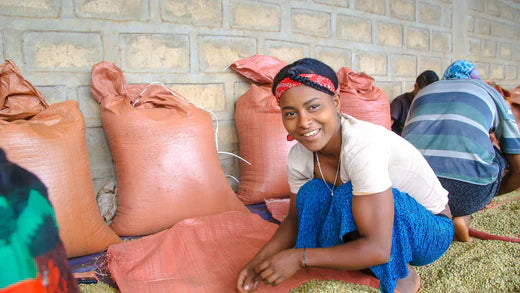A good decision is based on knowledge, and not on numbers.
– Plato
The Evolution of a New Coffee Blend Focused on Health
Scientists have known about hundreds of compounds in roasted coffee for decades, publishing breakthroughs in their own circles, but because the journals are not easily available outside of academia, exciting findings lay hidden from most of us, unless something actually makes it to the mainstream news. Because of this, coffee is often seen as being synonymous with caffeine, its most researched compound.
Virtually ignored were dozens of constituents: polyphenols, trigonelline, melanoidins, diterpenes, etc., that positively impact health as powerfully as caffeine does—the effects are just not as immediately noticeable. Many health-conscious drinkers now seek out high quality low caffeine coffee, which delivers these compounds while offering a gentler experience for daily consumption.
Lucky for us, Google Scholar launched in 2004 and introduced us to tens of thousands of journal articles, allowing us to leverage the work of scientists and keep up with the research on coffee that could impact health. Throughout product development, we ask the question, “What is the healthiest way to complete this step of the process? What happens if we make every decision focusing on wellness and following the science?”
We did this in 2016 with our flagship coffee, FLOW, followed in 2017 by our decaf, CALM. Spoiler alert: We’ve just upgraded CALM to become what we believe is now the healthiest and most delicious decaf available anywhere in the world. Why would we say that? Please read on!
After creating CALM, we researched what would make a healthy dark roast, which also turned out to be good for the gut, and in 2018 we launched EASE.
Science cannot tell us that everyone will react to coffee the same way. Individuals metabolize coffee compounds in their own way and tolerate compounds differently. Just because a specific compound is in coffee does not mean it will yield the results that are conjectured. Just as medicines affect people differently, plant compounds do as well. This is one reason we do not make health claims about our coffees.
Yet the science compels us to follow researchers’ clues and envision coffees that might be helpful tools in the nutritional toolbox for preventing diseases:
- In 2022 and 2023, we created a limited-edition coffee to raise awareness of coffee’s impact on the prevention of Alzheimer’s disease (ALZ) and raise money for our local ALZ charity.
- Last year, Purity Coffee® released PROTECT, which we envisioned and developed following the indisputable scientific evidence that coffee had dozens of compounds that positively impacted liver health.
This year, we turned our attention to type 2 diabetes (T2D), another disease that has mountains of scientific research associated with coffee. Again, we followed the science to create our new coffee, Purity BALANCE™. It is formulated with 2/3 of our decaf (CALM) and 1/3 of our core coffee from Honduras, a special Demeter Biodynamic Organic, Smithsonian Bird Friendly, woman-owned farm. We special roast this 1/3 washed arabica to a curve that maximizes the chlorogenic acids, trigonelline and other nutrients in a way that is different from how we use that coffee in other blends. It adds dimension and a unique “lime blossom” note to the dry fragrance that is intoxicating. The benefits of the coffee we have developed to match the research go far beyond the possibility of warding off T2D. So many people seeking to manage their caffeine intake but who don’t want to miss out on the antioxidants and nutrients can take advantage of this coffee.
Introducing our new coffee: BALANCE
Being “in balance” is the act of balancing the many aspects of our lives, each of which needs distinct levels of attention at different points in time. Drinking Purity’s new coffee, Balance, is as much about doing math on caffeine as it is about getting maximum antioxidant activity from its chlorogenic acids and trigonelline and prebiotic activity from its melanoidins. For many, it represents one of the best coffee for chlorogenic acid options available today.
A few weeks ago, we wrote a post on caffeine with details on who should avoid caffeine. There are real reasons to do so, and our findings on caffeine informed our development of Purity BALANCE™.
Doing the Math
It is highly likely that at some point in our lives, we’ve been told by wellness professionals to either cut out coffee altogether or limit our coffee intake to 1 cup per day. What they probably mean by that is to limit our caffeine intake. The FDA's website states, “For healthy adults, the FDA has cited 400 milligrams a day—that's about four or five cups of coffee—as an amount not generally associated with dangerous, negative effects.” Doing the math, that means the FDA calculates a cup of coffee contains between 80 and 100 milligrams.
Purity’s lab tests confirm this FDA calculation. When we lab tested our Pocket Purity sachets (net weight of 13g or 14g), the results showed between 88 and 99.4 milligrams for Flow, Ease and Protect. Our decaffeinated Calm (13 g) contained only 3 milligrams of caffeine. Balance (14g) has approximately 27 milligrams of caffeine.

If you have 3 cups of Purity BALANCE™, you will have about the same caffeine as 1 cup of Purity EASE, but you will get more than 3 times the antioxidants. Those total polyphenols are equal to half a cup of blueberries. In other words, if you are used to drinking 3 to 4 cups of coffee a day but want to cut down on your caffeine and limit yourself to “1 cup of coffee” a day, you can still enjoy the habit that brings you helpful antioxidants and other nutrients. For anyone aiming to maximize these benefits, choosing premium antioxidant coffee ensures that every cup delivers the highest possible levels of protective compounds.
We believe it can be one of the healthiest choices a person makes to drink Purity BALANCE™, and below is the science we followed to get to this opinion.
Coffee and T2D, Heart, Blood Sugar, and Overall Health
Diabetes has rapidly grown into one of the largest epidemics in human history, with no signs of slowing down. (1) In the United States, 34.2 million people are living with diabetes and 88 million with prediabetes, but 80% of those with prediabetes don't even know they have it.(2) Metabolic syndrome includes high blood sugar and blood pressure, low HDL levels, central obesity, and high triglycerides as risk factors for both T2D and cardiovascular disease. (3) A shared underlying characteristic of cardiovascular disease and diabetes is inflammation.
A dose-response meta-analysis and systematic review on coffee consumption and T2D was published in 2014. This study analyzed data from 109,272 participants, concluding that drinking six cups of coffee per day was associated with a 33% reduction in the risk of T2D.(4) Studies have also identified a 9% lower risk of metabolic syndrome for high coffee drinkers versus low coffee drinkers.(5)
In another study, individuals who increased their coffee consumption by one cup per day (compared to those who made no change) lowered their relative risk of T2D by 11%. However, those who decreased coffee consumption by 1-2 cups per day raised the relative risk of T2D by 17%.(6)
Caffeine, Chlorogenic Acids and Decaffeinated Coffee
There's evidence that caffeinated and decaffeinated coffee both help prevent prediabetes and type 2 diabetes due to their effects on insulin sensitivity and beta-cell function. Caffeine causes a decrease in glucose tolerance,(7) which means that the body is less able to process glucose, the main source of energy for cells. However, coffee also contains a notable amount of the antioxidant polyphenols, chlorogenic acids (CGA). These compounds play a role in increasing insulin sensitivity,(8) meaning the body is more responsive to insulin, which helps your cells take up glucose from your blood and use it for energy. With high insulin sensitivity, blood sugar levels are lower and more stable, and less insulin is needed to maintain them. This can reduce the risk of developing T2D and other health problems related to high blood sugar, such as heart disease, kidney disease, nerve damage, and eye problems.
To confirm CGA’s role in this area, researchers have concluded that coffee's ability to promote weight loss is not dependent on its caffeine content.(9) A German study associated the consumption of four cups or more of decaf coffee with a 30% lower incidence of type 2 diabetes, compared to 23% for caffeinated coffee. Researchers concluded that coffee’s polyphenols showed an impact on various diabetes-related processes, including gluconeogenesis, glucose transport, and insulin secretion.(10) This study and others demonstrated that coffee intake and diabetes risk correlations may rely more heavily on coffee's bioactive compounds other than caffeine.
In particular, CGA increases the production of glucagon-like peptide 1 (GLP-1), which studies show may protect against diabetes by making beta cells more sensitive to high blood sugar. (11) Another risk factor for diabetes is the accumulation of misfolded proinsulin or amylin molecules in the beta cells. Coffee’s 5-O-caffeoylquinic acid, pyrocatechol, and melanoidins may help preserve beta-cell function by disrupting this process. Additionally, chlorogenic acid and caffeic acid may counteract some of the damaging effects of a high-fat diet on pancreatic beta cells.(12)
Additional important but often overlooked constituents:
Diterpenes
Diterpenes are found in coffee that influence the liver, muscle, bone, skin, and immune system cells. The two prominent diterpenes naturally present in coffee are cafestol and kahweol. Some of their potential anti-diabetic properties include increasing insulin secretion, enhancing uptake of glucose by skeletal muscle, and suppressing inflammation.(13)
To look at what diterpenes might do to cells that make insulin, researchers in one study treated rat pancreatic b-cells with kahweol first, then used streptozotocin (STZ) to damage the cells. Kahweol treatment increased insulin content, boosted insulin secretion, enhanced glucose uptake, and offered protective antioxidant activity. This study shows kahweol's potential for restoring insulin-mediated glucose metabolism (previously demonstrated by cafestol in other studies).(14)
Trigonelline
Trigonelline is a plant hormone found in substantial amounts in fenugreek, a traditional Chinese medicine herb used for diabetes prevention. Coffee also contains trigonelline, which is why this compound has been attributed to some of the anti-diabetic effects of decaffeinated coffee. Two forms of vitamin B3, nicotinic acid and nicotinamide, are the roasting products of trigonelline. Vitamin B3 helps convert food into energy and is involved in cellular metabolism, cell signaling, and making and repairing DNA, in addition to acting as an antioxidant.(15)
Trigonelline itself demonstrates protective effects in multiple animal studies, including enhanced insulin sensitivity, inhibition of glucose uptake in the intestines, and pancreatic beta-cell regeneration. Some studies have demonstrated that a combination of trigonelline and chlorogenic acids slows down the glucose and insulin response in oral glucose tolerance tests. Trigonelline also lowered serum tumor necrosis factor (TNF)-a, a pro-inflammatory cytokine and known promotor of insulin resistance. In vitro, trigonelline inhibits adipocyte proliferation and lipid accumulation in differentiating adipocytes, meaning it prevents or reduces the growth and multiplication of adipocytes, which are fat cells that store energy in the form of lipids. Interfering with these factors reduces the amount of fat tissue in the body, suggesting potential anti-obesity effects.(16)
Micronutrients
Coffee is a low-sodium beverage that provides the micronutrients potassium and magnesium. Purity Coffees have between 260 mg and 275 mg of potassium per 8-ounce cup and between 29 mg and 32 mg of magnesium. (One banana has about 400 mg of potassium.)
Because of the higher risk of heart disease, people with type 2 diabetes are strongly encouraged to meet the American Diabetes Association recommendation of 4680 milligrams of potassium each day and limit sodium to 2300 milligrams per day or less. Unfortunately, population studies reflect a low adherence to these guidelines.(17)
Magnesium has known effects on diabetes risk and heart health. People with diabetes are at a higher risk of magnesium deficiency due to their higher urinary output of magnesium. Additionally, diets low in magnesium are associated with hypertension and stroke. Lower serum magnesium levels also raise the risk of sudden cardiac death.
High dietary intakes of magnesium significantly reduce the risk of type 2 diabetes, as magnesium plays a direct role in glucose metabolism.(18) But it's essential for magnesium to come from the diet, as the ability of magnesium supplementation to mitigate heart disease and diabetes risk hasn't been proven. Most adults are advised to get between 300 and 420 milligrams of magnesium per day. Although nuts, seeds, vegetables, and grains are the biggest contributors of magnesium to the diet, three to four cups of coffee could contribute almost 100 milligrams of magnesium to the total daily intake.
There is more to life than increasing its speed.
– Mahatma Gandhi
Purity BALANCE™: The Coffee
BALANCE exceeds our own quality standards and has helped us set the bar higher for ourselves. The certified organic coffees used in this blend come directly from women-owned farms in Colombia and Honduras, and they arrive at regular intervals throughout the year (so these coffees are always the freshest). We believe this is the healthiest, freshest, and best-tasting lightly caffeinated coffee available in the U.S. today. The coffee is:
- Certified Organic and Specialty-Grade: This is the highest quality in health and taste.
- Certified Bird Friendly (the only decaf we know on the market with this seal): This certification is the gold standard in organic farming because it is regenerative and maintains critical forests, trees and the natural environment.
- Certified Con Manos de Mujer: Women run the farms, collectively deciding on everything from leadership to quality control.
- The 2/3 decaffeinated portion of the blend is Certified Swiss Water Decaffeinated: A proprietary, all-natural method of removing caffeine from coffee beans by using water and charcoal filters without adding any chemicals or altering the flavor of the coffee. The CGAs and nutrients are unaltered as well.
- The 1/3 caffeinated portion of the blend is from a farm that is also Demeter Biodynamic certified.As with all of our coffees, it is lab tested to be free of molds, mycotoxins, and other unhealthy contaminants, and the roast curves were developed consciously to maintain the maximum levels of beneficial compounds.
We truly hope that BALANCE helps you find peace and equilibrium whenever they are needed. Please give us your feedback and send us questions or comments—we really value your input. It’s our customers who have continued to inspire us to keep advancing. We look forward to hearing from you.
- (1) Zimmet PZ. Diabetes and its drivers: the largest epidemic in human history? Clin Diabetes Endocrinol. 2017;3(1):1. doi:10.1186/s40842-016-0039-3
- (2) Centers for Disease Control and Prevention. Diabetes and prediabetes.
- (3) Luc K, Schramm-Luc A, Guzik TJ, Mikolajczyk TP. Oxidative stress and inflammatory markers in prediabetes and diabetes. J Physiol Pharmacol. 2019;70(6):10.26402/jpp.2019.6.01. doi:10.26402/jpp.2019.6.01
- (4) Nieber K. The impact of coffee on health. Planta Med. 2017;83(16):1256-1263. doi:10.1055/s-0043-115007
- (5) Poole R, Kennedy OJ, Roderick P, Fallowfield JA, Hayes PC, Parkes J. Coffee consumption and health: umbrella review of meta-analyses of multiple health outcomes [published correction appears in BMJ. 2018 Jan 12;360:k194]. BMJ. 2017;359:j5024. Published 2017 Nov 22. doi:10.1136/bmj.j5024
- (6) Kolb H, Martin S, Kempf K. Coffee and lower risk of type 2 diabetes: arguments for a causal relationship. Nutrients. 2021;13(4):1144. doi:10.3390/nu13041144
- (7) Lestari S, Sunaryo T, Arvianto RI. Preparation of decaffeinated coffee extract: study of the effectiveness of decaffeinated coffee extract toward lowering blood sugar in type 2 diabetes mellitus patients. The Medical Journal of Malaysia. 2023 Jul;78(4):515-518. PMID: 37518924.
- (8) Lestari S, Sunaryo T, Arvianto RI. Preparation of decaffeinated coffee extract: study of the effectiveness of decaffeinated coffee extract toward lowering blood sugar in type 2 diabetes mellitus patients. The Medical Journal of Malaysia. 2023 Jul;78(4):515-518. PMID: 37518924.
- (9) Sirotkin A, Kolesarova A. The anti-obesity and health-promoting effects of tea and coffee. Physiol Res. Published online 2021:161-168. doi:10.33549/physiolres.934674
- (10) Nieber K. The impact of coffee on health. Planta Med. 2017;83(16):1256-1263. doi:10.1055/s-0043-115007
- (11) McCarty MF. A chlorogenic acid-induced increase in GLP-1 production may mediate the impact of heavy coffee consumption on diabetes risk. Medical Hypotheses. 2005;64(4):848-853. doi:10.1016/j.mehy.2004.03.037
- (12) Lee A, Lim W, Kim S, et al. Coffee intake and obesity: a meta-analysis. Nutrients. 2019;11(6):1274. doi:10.3390/nu11061274
- (13) Ren Y, Wang C, Xu J, Wang S. Cafestol and Kahweol: A review on their bioactivities and pharmacological properties. Int J Mol Sci. 2019;20(17):4238. Published 2019 Aug 30. doi:10.3390/ijms20174238
- (14) El-Huneidi W, Anjum S, Bajbouj K, Abu-Gharbieh E, Taneera J. The coffee diterpene, kahweol, ameliorates pancreatic β-cell function in streptozotocin (Stz)-treated rat ins-1 cells through nf-kb and p-akt/bcl-2 pathways. Molecules. 2021;26(17):5167. doi:10.3390/molecules26175167
- (15) Vieira Porto AC, Farah A. Chapter 18. Potential effects of trigonelline and derivatives on health. In: Farah A, ed. Coffee. Royal Society of Chemistry; 2019:432-455. doi:10.1039/9781788015028-00432
- (16) Lee A, Lim W, Kim S, et al. Coffee intake and obesity: a meta-analysis. Nutrients. 2019;11(6):1274. doi:10.3390/nu11061274
- (17) Baqar S, Michalopoulos A, Jerums G, Ekinci EI. Dietary sodium and potassium intake in people with diabetes: are guidelines being met?. Nutr Diabetes. 2020;10(1):23. Published 2020 Jun 17. doi:10.1038/s41387-020-0126-5
- (18) National Institutes of Health (NIH), Office of Dietary Supplements. Magnesium fact sheets for consumers. Updated March 1, 2022.
Additional Sources:
- Cornelis M, Munafo M. Mendelian randomization studies of coffee and caffeine consumption. Nutrients. 2018;10(10):1343. doi:10.3390/nu10101343
- Górecki M, Hallmann E. The antioxidant content of coffee and its in vitro activity as an effect of its production method and roasting and brewing time. Antioxidants. 2020;9(4):308. doi:10.3390/antiox9040308
- Institute for Scientific Information on Coffee. Coffee composition & nutritional information.
- Kolb H, Martin S, Kempf K. Coffee and lower risk of type 2 diabetes: arguments for a causal relationship. Nutrients. 2021;13(4):1144. doi:10.3390/nu13041144
- Lestari S, Sunaryo T, Arvianto RI. Preparation of decaffeinated coffee extract: study of the effectiveness of decaffeinated coffee extract toward lowering blood sugar in type 2 diabetes mellitus patients. The Medical Journal of Malaysia. 2023 Jul;78(4):515-518. PMID: 37518924.
- Mathur K, Agrawal RK, Nagpure S, Deshpande D. Effect of artificial sweeteners on insulin resistance among type-2 diabetes mellitus patients. J Family Med Prim Care. 2020;9(1):69-71. Published 2020 Jan 28. doi:10.4103/jfmpc.jfmpc_329_19
- National Institute of Diabetes and Digestive and Kidney Diseases (NIDDK). Recommended tests for identifying prediabetes.
- Ohishi T, Fukutomi R, Shoji Y, Goto S, Isemura M. The beneficial effects of principal polyphenols from green tea, coffee, wine, and curry on obesity. Molecules. 2021;26(2):453. doi:10.3390/molecules26020453
- Rice Bradley BH. Dietary fat and risk for type 2 diabetes: a review of recent research. Curr Nutr Rep. 2018;7(4):214-226. doi:10.1007/s13668-018-0244-z
- Scheithauer TPM, Rampanelli E, Nieuwdorp M, et al. Gut microbiota as a trigger for metabolic inflammation in obesity and type 2 diabetes. Front Immunol. 2020;11:571731. doi:10.3389/fimmu.2020.571731
- Shi L, Brunius C, Johansson I, et al. Plasma metabolite biomarkers of boiled and filtered coffee intake and their association with type 2 diabetes risk. J Intern Med. 2020;287(4):405-421. doi:10.1111/joim.13009
- Stamataki NS, Crooks B, Ahmed A, McLaughlin JT. Effects of the daily consumption of stevia on glucose homeostasis, body weight, and energy intake: a randomised open-label 12-week trial in healthy adults. Nutrients. 2020;12(10):3049. Published 2020 Oct 6. doi:10.3390/nu12103049
- Sharma S, Mandal A, Kant R, Jachak S, Jagzape M. Is cinnamon efficacious for glycaemic control in type-2 diabetes mellitus?. J Pak Med Assoc. 2020;70(11):2065-2069.
- Vieira Porto AC, Farah A. Chapter 18. Potential effects of trigonelline and derivatives on health. In: Farah A, ed. Coffee. Royal Society of Chemistry; 2019:432-455. doi:10.1039/9781788015028-00432
- Walbolt J, Koh Y. Non-nutritive sweeteners and their associations with obesity and type 2 diabetes. JOMES. 2020;29(2):114-123. doi:10.7570/jomes19079
1 comment









I feel so blessed to have been a part of purity for as long as I have trying all the new blends that you are putting out I actually have been a huge 5 pound purchaser of the calm, but I always add another purity coffee to add some caffeine now you’re doing that for me with all the benefits that I have in mind I’m 74 my health is better than most 40-year-olds I’m not on any medication’s. My weight is 100 pounds I’m 5’ and I am thriving and I actually was considering cutting out my coffee because of what I have been reading in regards to caffeine, not being good for healthy blood flow heart health, but because of all the research and the details and the information that you share with us I am confident in the coffee 100% that I get from purity and I’m excited to try the new coffee calm, blend with caffeine, especially since you have improved the calm the flavor was a little flat. But I as you can see, continued to order my 5 pound bags while trying other blends that you have made. Thank you so much for sharing all of this valuable information and standing behind your purity brand coffee❣️
Leave a comment